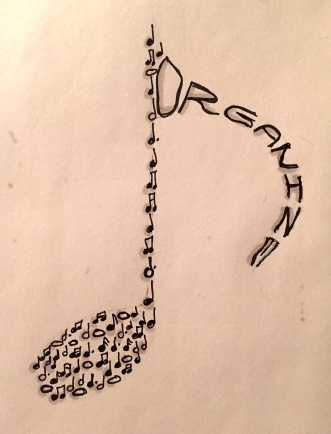
Recently I have been places* where one word rings out above and through all others: organize.
One beautiful way it rings out is literally, when people sing it: here is an example, from a community sing led by April Cadell at the Highlander Center for Research and Education, in New Market, Tennessee. The parts you’ll hear, in order of appearance, are “organize,” “el pueblo unido jamás será vencido,” and “si, se puede” (to just hear everything at once, skip to the 0.55 mark).
April also remixed “Eyes on the Prize” to use “Organize!” instead of “Hold On”…which, if you know it, you can imagine might be amazing, and you’d be right.
I sang these songs standing next to my father, who worked as a lifeguard and office assistant at Highlander in 1957, when it was in Monteagle instead of New Market, and still run by Myles Horton, after whom one of my brothers is named. Septima Clark ran the office my father assisted in. Pete Seeger was his roommate. Our trip marked the first time he’d ever been to the new location (“new” as in “since 1975.”) So when, on our ride back to Georgia, he declared “I liked the singing best,” I knew that “best” meant even better than all the other events of the Homecoming weekend, including a book talk by a fellow radical political economist. I almost cried, because: me too, Dad! Wow.
So that’s what I feel about the word “organize” right now, and that’s what’s most present for me in these autumnal days…and then I also have Thoughts. Thoughts on Etymology, and Here Those Are, Y’all, Because They Are Also Fun!
In a recent shower, I had a moment of stockstillness, in which I stood naked and stunned that I’d never before considered this set of words as a set: organize; organ; organic. These each mean such very different things, indeed each word itself even has multiple meanings, and I’d just never even wondered at the connections that must be there.
The first part of looking into this was hilarious, because I started, as I always do, in my 1934 Webster’s International Dictionary, and under “organ” it’s 95% words and pictures about musical instruments. I thought for a minute that there wasn’t even a mention of the squishy inside bits we all have, but I did locate that eventually.

Then, on the same page, “organize.” Remember that this dictionary lists the oldest uses first, not the most common uses as of 1934, but still, “1” here tickled me.
“To furnish with organs” generates quite a different picture than does “to give an organic structure to,” the former picture including bloody gauze and scalpels, so a semi-colon dividing the two reads as insufficient here in 2015. But I trust that the dictionary made the distinctions it meant to make.
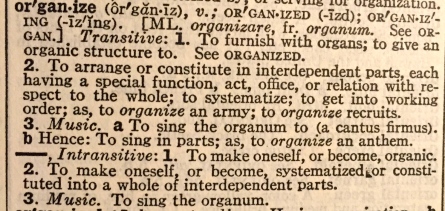
And then look at 3b! “Organize” has a sense of “to sing in parts”! I can’t even handle how awesome this is. Organize, organize, organi-i-ize indeed. This is also amazing to me because the phrase “preaching to the choir” is often leveled at spaces (or people in them) where most are like-minded, and sometimes I am in those very spaces. In my head I’ve been playing with the upgrade, “organize the choir” and holy cannoli, given 3b, this could be literal or figurative or both and that’s about the most I can ask of a phrase. Hooray!
As for “organic”: well, 1934 obviously is not going to talk about Monsanto (though the “free from pesticides and fertilizers” sense dates all the way back to 1942), but I thought it might connect in some way to modernity.
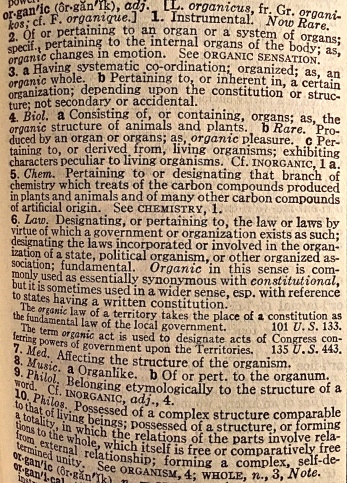
It does not much, except for 5. Chem. While they haven’t much lived on, let us also rejoice at the mere presence of philology AND philosophy AND music here too! Who knew?! Backing up a bit, we can also note that “organic” it seems to derive from a Greek offramp– it’s directly from Greek organikos “of or pertaining to an organ, serving as instruments or engines.” The Online Etymology Dictionary adds that this is from Greek organon “instrument.” I’d call this an “offramp” because “organ” itself comes via Old English and French from Latin organum, which began life as Proto-Indo-European werg-ano-, from root *werg “to do.” It eventually became the aforementioned Greek organon, “instrument,” because the direct translation was“that with which one works.”
So: organikos derived from organon and eventually gave us “organic,” rather than “organic” having emerged from our word “organ.” This kind of thing makes my head explode…in rainbows of love for the simultaneously systematic and batshit crazy nature of language contact and change.
Anyway, after all that, I realized I’d totally missed a member of the set: “organism”! Go ahead and really read this one. Take a minute.
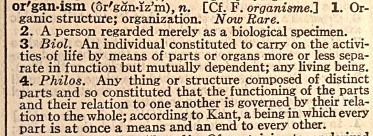
Often I’m more charmed by the earlier glosses of words, unless they are explicitly racist or sexist, because they are closer to the etymological source, or just weird, or both. In this case though, the progression of meanings through the ages seems to line up with something deep and developmental about humanity its damn self. I find it very dear, and a nice, high note to end on.
—
*…and these places are great and you can find out about them! People’s Institute for Survival and Beyond; The Southern Movement Assembly (via Project South); and the Highlander Center.
Below are the visual notes I took at a few sessions of SMA. They are in order and they get bigger if you click on them.
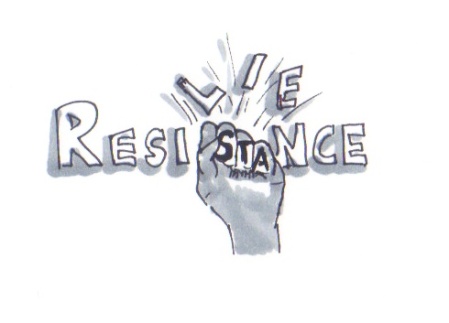
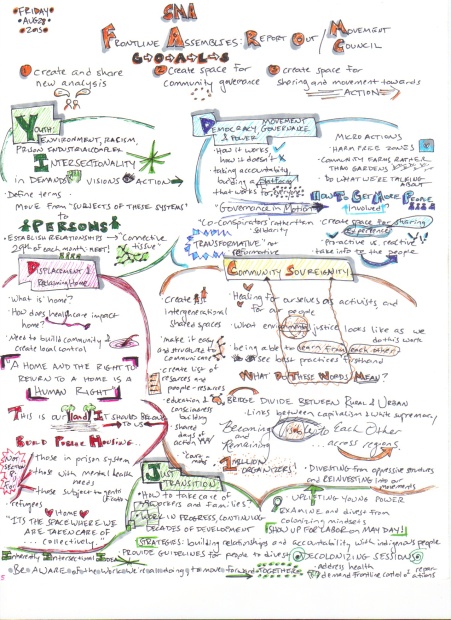
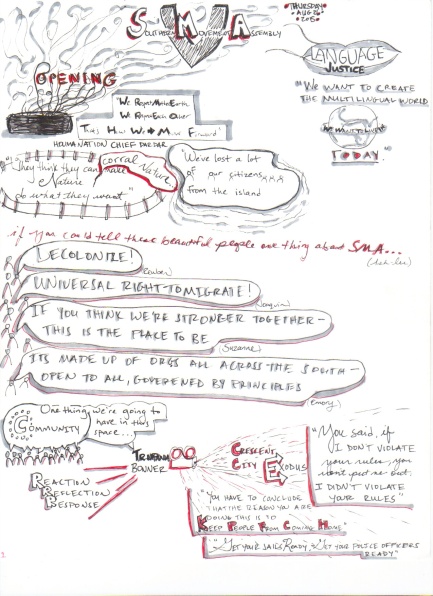
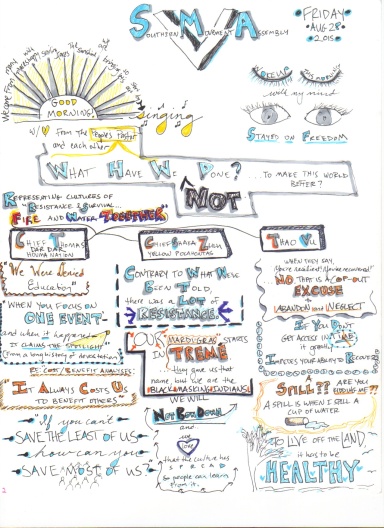
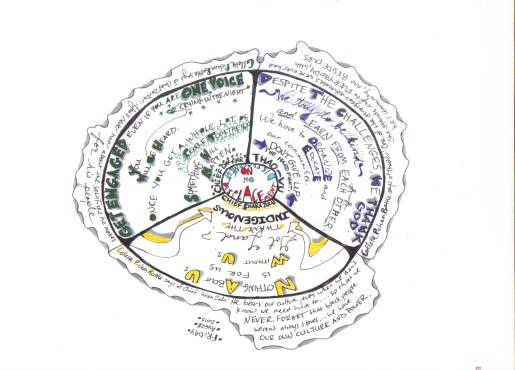
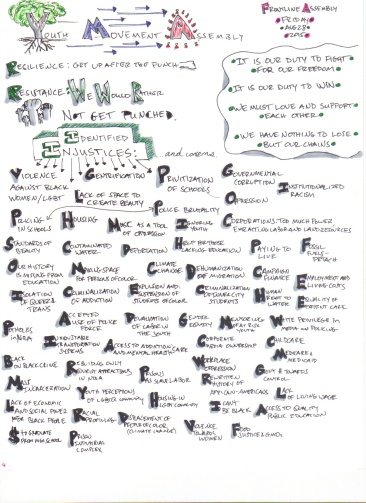
GREAT edition! Thank you for thinking, feeling, sketching, searching, and writing!
LikeLike
YOU’RE a great edition, James Derkits. And thanks as always for reading.
LikeLike
Thank you for doing this. This captures so much. what a contribution!
-Colette Pichon Battle
LikeLike
Wow–thank you so much, Colette! (For the reader who may not know the remarkable work of Colette Pichon Battle, go get information about the Gulf Coast Center for Law and Policy: http://www.gcclp.org/)
LikeLike